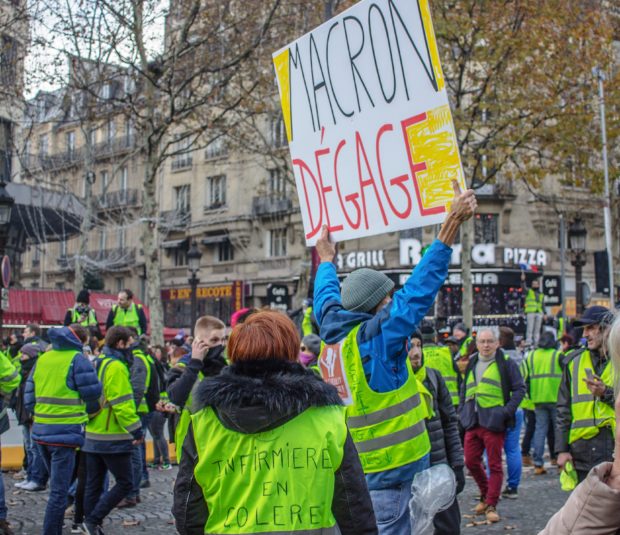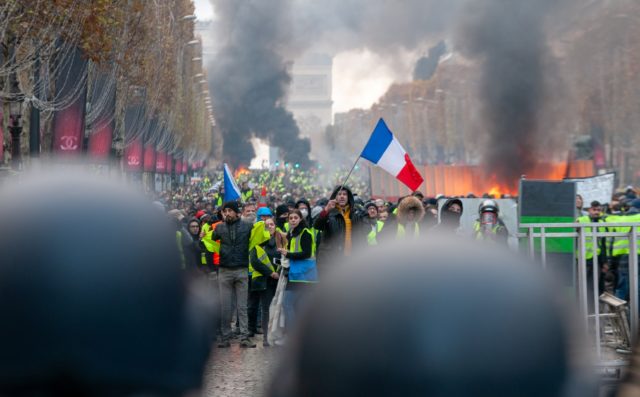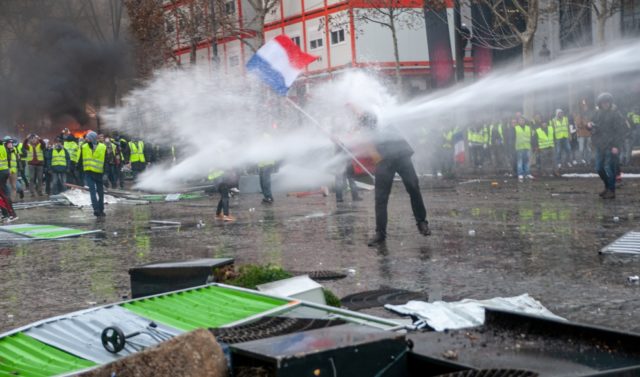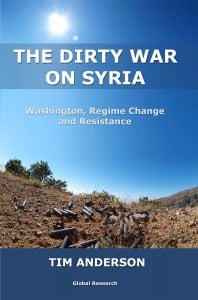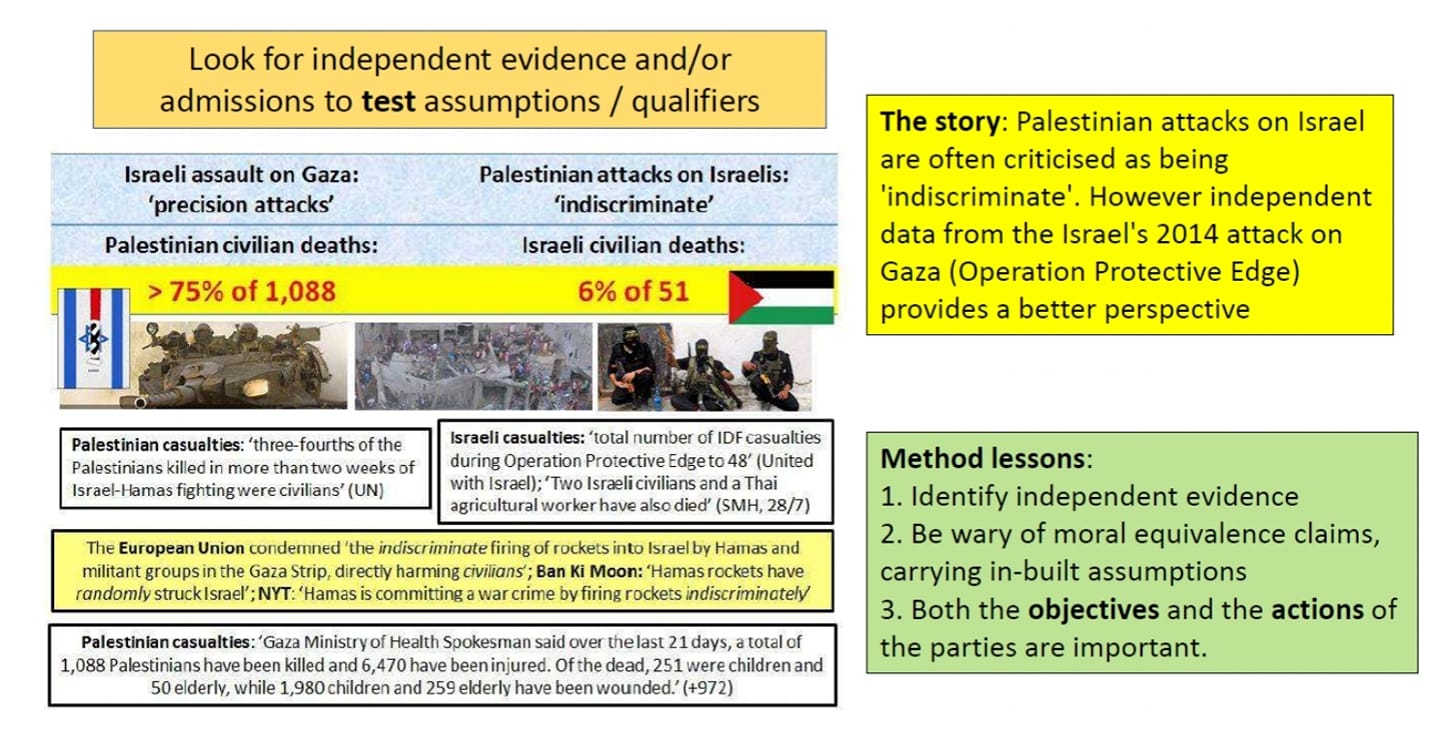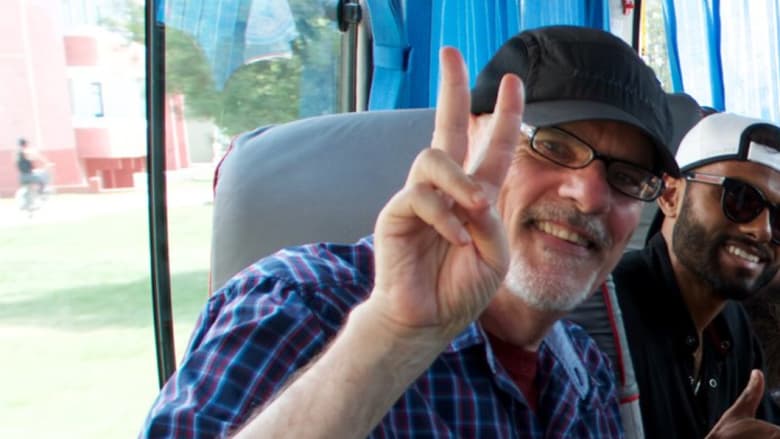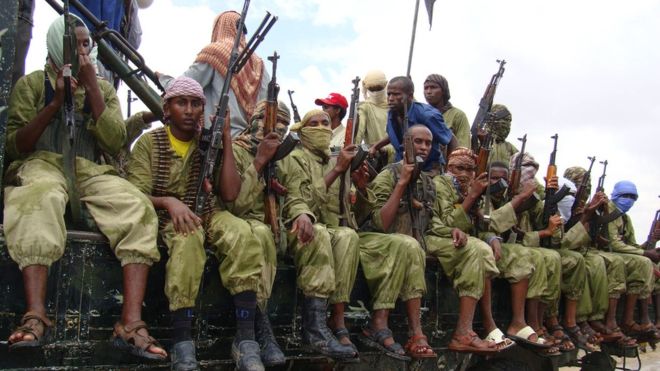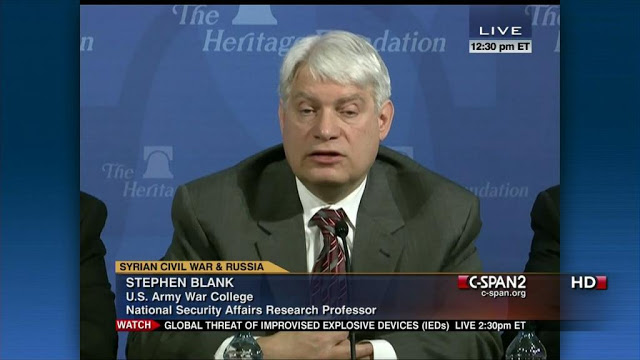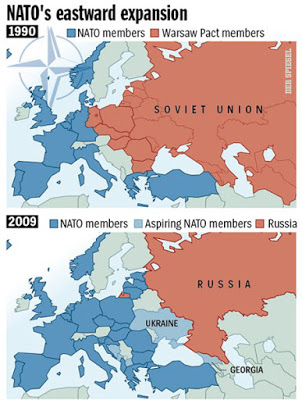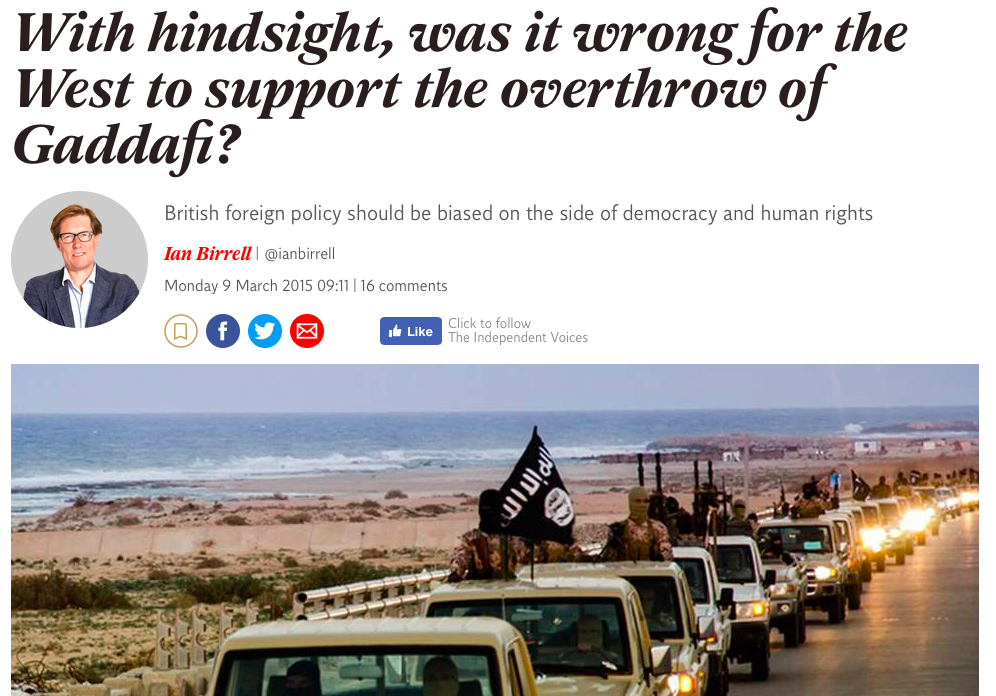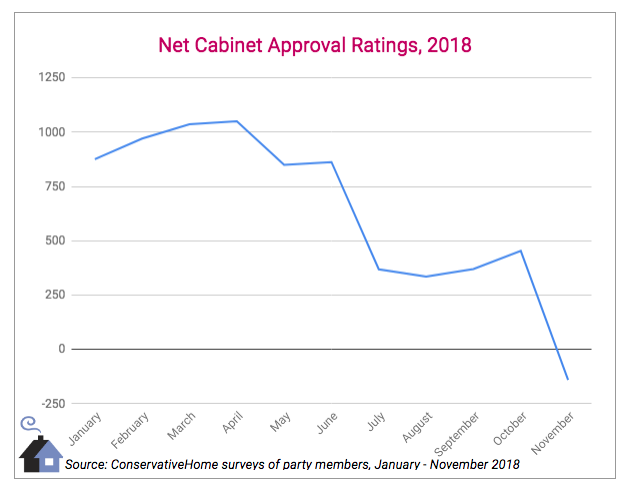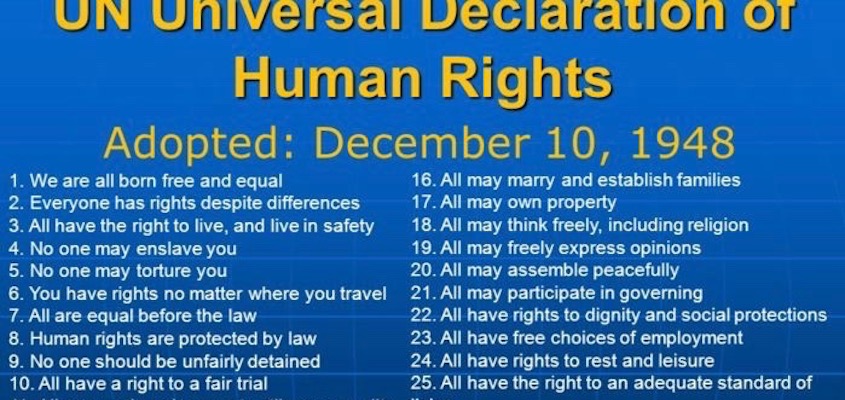On 4 December 2018, HuffPost published an article by senior editor Chris York, whose single purpose was to discredit Professor Piers Robinson of the University of Sheffield (UK). Prof. Robinson is Chair in Politics, Society and Political Journalism and researches communication, media and world politics, focusing on conflict and war. His current teaching includes research methods, introduction to political communication as well as propaganda, media and conflict. The University of Sheffield’s Department of Journalism Studies is considered one of the most prestigious in the U.K.
While mass media are certainly entitled to criticize whomever they wish, it is quite rare that they devote an entire article to destroy the reputation of an academic. One can, therefore, assume that the attack on Prof. Robinson’s reputation was ordered by higher-ups for reasons that will become evident in this essay.
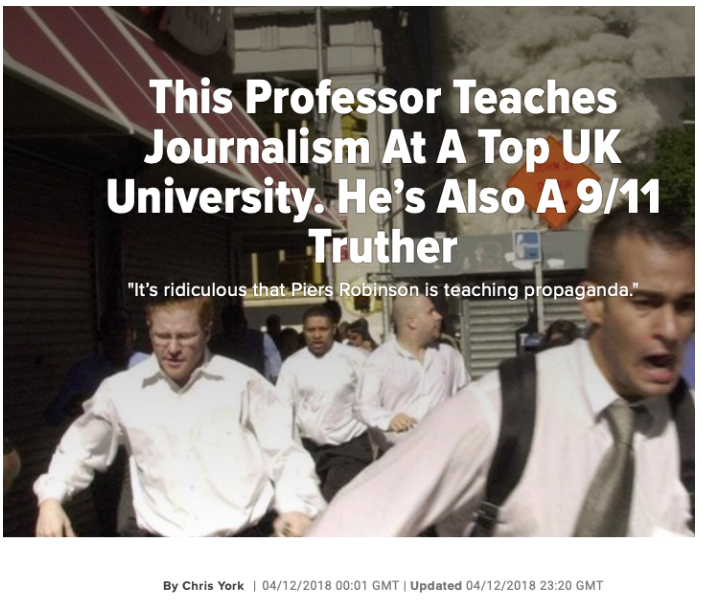
Screengrab from HuffPost
HuffPost’s unconscionable attack on Prof. Robinson’s personal integrity
The introductory paragraph of the article reveals its slanderous intent.
“An academic teaching journalism students at one of the UK’s top universities has publicly supported long-discredited conspiracy theories about the 9/11 terror attack, HuffPost UK can reveal.”
The journalist left no stone unturned in his efforts to discover controversial statements by Prof. Robinson. He found three academics willing to berate Prof. Robinson: Lydia Wilson, an Oxford and Cambridge research fellow and editor of the Cambridge Literary Review, Yasser Munif, a Lebanese expert on middle eastern politics and society at Emerson College, Boston and Nader Hashemi, director of the Center for Middle East Studies at the University of Denver. They offered nothing more than their personal opinions. Disregarding the rule of neutrality, HuffPost did not talk with academics who support Prof. Robinson or with any of the thousands of academics and experts who share his conclusions.

It is not, however, bad journalism that prompted me to write the present essay, but HuffPost’s deliberate attack on people of integrity who dare question the official account of 9/11. In order to discredit Prof. Robinson, the author cited Lydia Wilson to express her personal opinion about the book “9/11 Unmasked”, to which Prof. Robinson had given good marks:
″It’s ridiculous that Piers Robinson is teaching propaganda. The most troubling thing for me is how did he get this job? It’s not hard to uncover this man. [The review of ‘9/11 Unmasked’ by Prof. Robinson] is conspiracy-theory driven. There’s no academic who should write a post like – there’s no argument and there’s no evidence. It’s dangerous to students – he’s working in a journalism department and he can’t analyse journalism sources.”
Prof. Robinson is entitled, like any other person, to the presumption of good faith. To insinuate that his research is “conspiracy-theory driven” is unconscionable.
HuffPost’s attack on the quest for truth and justice
The attack on Prof. Robinson was no personal vendetta. It rather represents an attack on all scholars who dare question the official account on 9/11, including myself.
In the present article, I intend to expose one particularly grievous lie promoted by the U.S. government with regard to 9/11, namely the legend that 19 fanatic Muslims boarded and hijacked four aircraft, in order to crash these aircraft on known landmarks. A comprehensive study of this particular question is found in my book “Hijacking America’s Mind on 9/11” (Algora Publishers, New York, 2013).
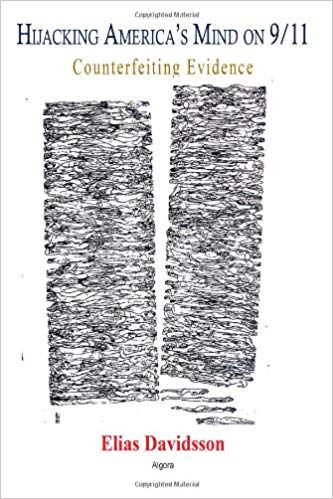 (1) The purpose of a murder investigation
(1) The purpose of a murder investigation
One basic goal of a murder investigation is to identify the perpetrators. In order to prove that particular individuals could have hijacked an aircraft, it must be first demonstrated that they boarded that particular aircraft. In order to demonstrate this fact, the following four classes of evidence should have been produced by the US authorities in September 2001 or shortly thereafter:
- Authenticated passenger lists (or flight manifests), listing the names of all the passengers and crew members, including those suspected of hijacking;
- Authenticated security videos from the airports, which depict the passengers (and the alleged hijackers);
- Sworn testimonies of personnel who attended the boarding of the aircraft;
- Formal identification of the bodily remains from the crash sites, accompanied by chain–of–custody reports.
Did the US government produce the above four classes of minimal evidence and if so, is that evidence admissible, relevant and compelling? If such evidence does not exist or is deemed to lack credibility, it is likely that these individuals did not board the aircraft and that, consequently, no “Islamic hijackings” had taken place.
(2) The living dead hijackers
Shortly after the FBI released names and photographs of the alleged hijackers, questions about their identities began to emerge. The family of Hamza al-Ghamdi, one of the alleged hijackers, said the photo released by the FBI “has no resemblance to him at all”. CNN publicized a picture of another alleged hijacker, identified as Saeed al-Ghamdi. That man, a pilot, hailed from Tunisia alive. The photograph of a Saudi pilot by the name of Waleed al-Shehri was released by the FBI as one of the alleged hijackers: he protested his innocence from Casablanca, Morocco. Two people with the name of Abdulaziz Alomari presented themselves, surprised to see their names on the FBI list of suspected hijackers. One of them, a Saudi engineer, said he lost his passport while studying in Denver, Colorado, in 1995. Of the FBI list, he said:
“The name is my name and the birth date is the same as mine. But I am not the one who bombed the World Trade Center in New York.”
Another Abdulaziz Alomari was found working as a pilot with Saudi Airlines. Salem al-Hazmi, also listed by the FBI as an alleged hijacker, was indignant at being named as a suspect for a mass murder. He said he works in petrochemical plant in Yanbu (Saudi Arabia). Abdul Rahman al–Haznawi, brother of another suspect, said
“There is no similarity between the photo published [on Thursday] and my brother.”
He said he does not believe his brother was involved in the crime: “He never had any such intention.” Gaafar al-Lagany, the Saudi government’s chief spokesman in the United States, said that the hijackers probably stole the identities of legitimate Saudi pilots. The above findings have been corroborated independently by Jay Kolar.
The FBI disregarded these stories and maintained the names and photographs it originally posted on its website as those “believed to be the hijackers” of 9/11, including those of living individuals. The 9/11 Commission of Inquiry did not even mention these conflicting identifications.
(3) No authenticated passenger lists
The primary source used by airlines to identify the victims of aircraft crashes is the passenger list (sometimes designated as the flight manifest). A passenger list is a legal document proving – also for insurance purposes – that particular individuals boarded an aircraft. In order to serve as legal documents, passenger lists must be duly authenticated by those responsible for their issuance.
With regard to the four 9/11 flights, American and United Airlines have consistently refused to demonstrate that they possess authenticated passenger lists of these flights. Surprisingly, neither corporate media nor the 9/11 Commission demanded to see these authenticated documents.
Between September 11 and 14 September 2001, mainstream media published names of alleged hijackers and passengers. Some of these names were deleted and replaced by other names. Some of these irregularities are examined below.
Adding and deleting passengers’ names after the crashes
On 14 September 2001, the name of Mosear Caned (phon.) was released by CNN as one of the suspected hijackers on “a list of names (…) that is supposed to be officially released by [the Justice Department] sometime later today”. His name disappeared a few hours later from the list of suspects and replaced with that of Hani Hanjour when CNN posted a new list of suspects released by the FBI. It was never revealed where Caned’s name came from in the first place, who this person was supposed to be and why the name was later replaced by Hani Hanjour. No other passenger (or “hijacker”) bore a name resembling Mosear Caned.
The Washington Post reported, however, that the original passenger lists did not include the name of Hani Hanjour, later named as the pilot of flight AA77. In its final edition of 16 September 2001 the Post explained that Hanjour’s name “was not on the American Airlines manifest for [flight 77] because he may not have had a ticket.” For its information, the Washington Post relied almost exclusively on the FBI. This report fits with the declaration by Attorney General Ashcroft of 13 September 2001 that only four “hijackers” had been on flight AA77. Counsel for American Airlines, in a letter to the 9/11 Commission of March 15, 2004, appears to confirm the absence of Hanjour from that flight, writing, “We have not been able to determine if Hani Hanjour checked in at the main ticket counter.“ Yet Hanjour’s name appears later on unauthenticated passenger lists of flight AA77.
According to CNN of 14 September 2001,
“[f]ederal sources initially identified [Adnan] Bukhari and Ameer Bukhari as possible hijackers who boarded one of the planes that originated in Boston.” (emphasis added).
Yet, a few hours later, CNN issued the following correction:
“Based on information from multiple law enforcement sources, CNN reported that Adnan Bukhari and Ameer Bukhari of Vero Beach Florida, were suspected to be two of the pilots who crashed planes into the World Trade Center. CNN later learned that Adnan Bukhari is still in Florida, where he was questioned by the FBI…Ameer Bukhari died in a small plane crash” on 11 September 2000. These names disappeared from unauthenticated passenger lists published later and replaced by new names. CNN attributed this information to “federal sources.”
On the very day of 9/11, the FBI was already focused on [Amer] Kamfar” as a suspected hijacker. On the morning of 12 September eight FBI agents stood in front of the door of Henry Habora, Kamfar’s neighbor in Vero Beach, Florida, waiving a photograph of Kamfar, and asked Habora if he knew him. If the FBI suspected Kamfar to have been one of the hijackers and informed the media that he was a suspect, it could only have done so if his name was found on the original passenger list. Yet that name also disappeared from unauthenticated passenger lists publicized later.
On 12 September 2001, various newspapers published partial passenger lists of the crashed flights. These reports included the names of Jude Larson, 31, and his wife, Natalie, 24, referred to as passengers aboard flight AA11. As example thereof, here is an excerpt from a news report published by the Honolulu Star Bulletin on 12 September 2001:
Also among the confirmed dead was Jude Larson, the 31-year old son of Maui artist Curtis Larson, who was aboard American’s hijacked Flight 11. Jude Larson and his wife Natalie were en route to the University of California at Los Angeles, where he was attending college…Larson’s wife Natalie, whose family lives in Boston, was a rising fashion model and had been to Italy four times in the last 18 months to work for Gucci.
A person who claimed to be a friend of Jude’s father, a certain Steve Jocelyn of Lahaina on Hawaii, told the Honolulu Advertiser that Jude “was an amazing guy, a cool kid. He was a fun-loving, happy-go-lucky guy with a good heart.” He said that Jude had visited Maui often, was working as a horticulturist in Washington State but decided to enter medical school a few years ago. A week later, the same newspaper reported that it had been “unable to confirm the identity of (…) Steve Jocelyn,” and unable to locate him.
On 18 September 2001, the Honolulu Star Bulletin reported that the newspaper had received an email from Jude, giving notice that he and his wife were alive. According to the paper, “a person claiming to be with the airlines” had called Jude’s father and told him that his son and daughter-in-law had been passengers on flight AA11. The Honolulu Advertiser of 20 September 2001, which published a detailed report on this apparent hoax, wrote that Jude’s father Curtis Larson, a “sculptor and jewelry maker” now claimed he had been duped. Yet it was Curtis Larson who initially told reporters, that “his son was in medical school at UCLA, that his daughter-in-law was pregnant and that the couple had visited her family in Boston.” According to Jude, the report continued, his real name is not Larson but Olsen. He also said he is 30, not 31, years old, that he does not study in Los Angeles but works as a landscaper in Olympia, Washington State, and that his wife is not pregnant. The names of Jude and Natalie Larson then disappeared from unauthenticated passenger lists. Assuming that a prestigious news agency, such as Associated Press, would check with American Airlines and the FBI whether the Larsons were passengers on flight AA11 before releasing its story, it would follow that the Larsons were listed on the original passenger list of flight AA11 but later removed from the official list of dead passengers, or their names changed.
The aforementioned fluctuations in the number and names of the alleged hijackers could not have occurred if the names had been based on authentic passenger lists.
FBI and airlines’ refusal to release authentic passenger lists
I attempted in 2004 to obtain from American Airlines copies of authenticated passenger manifests for the two American Airlines flights of 9/11. Karen Temmerman, Customer Relations, American Airlines, responded to me on 9 September 2004:
At the time of the incidents we released the actual passenger manifests to the appropriate government agencies who in turn released certain information to the media. These lists were published in many major periodicals and are now considered public record. At this time we are not in a position to release further information or to republish what the government agencies provided to the media.
The airline did not explain why it was not in a position, at this time, to confirm what had already been for a long time in the public domain.
On November 29, 2005, I tried again to obtain the passenger list of flight AA77 from American Airlines. Sean Bentel of American Airlines first sent me a typed list that consisted of nothing more than the first and last names of 53 passengers from that flight. The list did not include Arab names. Asking again for “something more authentic”, Sean Bentel responded that ”the names I sent you are accurate…There may have been a formatting problem.” In turn I responded that the problem was not the formatting of the data. Here is what I wrote:
What I am asking is a replica of the original passenger list (either a scan of the original, or at least a document faithfully reflecting the contents of that list)…[namely] the list of the paying passengers who boarded AA77. Can I take it that the list you sent me faithfully reflects the names of the paying passengers who boarded AA77?
Within hours Sean Bentel answered in the most laconic manner: “Mr. Davidsson, Names of terrorists were redacted. Sean Bentel.” Asked in return “[w]hy can’t you sent me a facsimile copy of the passenger lists, including the names of the terrorists”, Sean Bentel answered, “This is the information we have for public release.” This was the end of this exchange.
I also turned to United Airlines. On October 21, 2004, I asked per email why the original flight manifests have not yet been publicized and whether United Airlines had provided some media with a copy of the original flight manifests. The airline answered that “[a]ll matters pertaining to the September 11th terrorist attacks are under the investigation of the US Federal Authorities. Please contact the FBI.” That was it.
I did not give up. In February 2012, I requested on the base of the Freedom Of Information Act (FOIA) from the FBI the release of Document 302, serial 7134, which contains “flight manifests for hijacked flights” and “information related to manifests.” The request was denied.
(4) No one saw the hijackers at the security checkpoints
According to the 9/11 Commission, ten of the 19 suspected hijackers were selected on 9/11 at the airports by the automated Computer Assisted Passenger Prescreening System (CAPPS) for “additional security scrutiny.” Yet none of those who handled the selected passengers, or any of the numerous airline or airport security employees interviewed by the FBI or the Federal Aviation Administration (FAA) on or after 9/11 is known to have been aware of these suspects. As for flights AA11 and UA175, which reportedly left from Logan Airport, Boston, the 9/11 Commission found that “[n]one of the [security] checkpoint supervisors recalled the hijackers or reported anything suspicious regarding their screening.”
(5) No one saw the hijackers at the boarding gates
The 9/11 Commission does not mention the existence of any deposition or testimony by airline personnel who witnessed the boarding of the aircraft. As a response to my request to interview American Airlines gate agents of flight AA77, the airline responded that their identities cannot be revealed for privacy reasons. Among the documents from 9/11 released in 2009, I found interviews with Liset Frometa (conducted on 11 September 2001) and Maria Jackson (conducted on 22 September 2001), who testified to have worked at gate 32 for flight AA11, and one FBI 302-form summarizing an interview with an unidentified female employee of American Airlines who testified on 11 September 2001 to have “worked the gate for AA flight 11”, but did not mention the gate number. Neither of these ladies recalled any of the alleged hijackers. Maria Jackson was shown a “photo spread of subjects” but did not recognize anyone from the photo spread. According to the FBI she “took the tickets for [Flight 11] from AA Flight Attendant Karen Martin and brought them to ticket lift and deposited them in the safe.”
(6) No authenticated CCTV of the hijackers
Apparently none of the three airports from where the 9/11 aircraft reportedly departed (Boston Logan, Newark International and Dulles Airport, Washington, D.C.) possessed security cameras at the boarding gates. There exists thus neither eyewitness testimony nor a visual documentation of the boarding process.
Yet many people are convinced that they saw on television footage of the suspected hijackers passing through security checks. What was shown appears to have been footage from the Portland (Maine) Jetport and from Dulles Airport in Washington, D.C.
The footage from Portland Jetport purports to show two men, captioned “Atta” and “Alomari” passing the security checkpoint before they board a connecting flight to Boston on the morning of 11 September 2001. Even if the video recording from Portland was authentic, in the sense of depicting two persons resembling “Atta” and “Alomari”, it does not prove that these two look-alike persons boarded any aircraft in Boston.
“Mohamed Atta and Abdulaziz Alomari” at Portland Jetport on 11 September 2001
The other footage shown on TV and found on internet sites, purports to depict the alleged hijackers of flight AA77 as they pass through the security checkpoint at Dulles Airport in Washington, D.C. This recording was only released in 2004, not by the authorities, but by the Motley Rice law firm representing some survivors’ families. According to the 9/11 Commission, the video “recorded all passengers, including the hijackers, as they were screened.” Yet none of the publicly available versions of this recording shows any of the over 50 passengers from flight AA77, some of whom were well known nationally.
Jay Kolar, who published a critical analysis of this footage, pointed out that the recording lacks a camera identification number and a time stamp (date:time clock). Joe Vialls, who also analyzed this video recording, wrote, “Just this single terminal at Dulles Airport has well over 100 such cameras, everyone of them with an individual camera identification number and date-time clock of its own.” He elaborated the point: “On-film data [such as camera number and date-time stamp] is essential of course, because it would be extremely difficult to track a target around the airport without these basic tools, and absolutely impossible to sort out the precise time and date of an event that occurred more than two years before, which is exactly what the 9-11 Commission now claims to have done.”
An extraordinary story about this footage was told by Dulles airport security manager Ed Nelson to authors Susan and Joseph Trento. Nelson said that shortly after arriving at Dulles airport on the morning of 9/11, FBI agents confiscated a security tape from a checkpoint through which they said the alleged hijackers had passed on the way to their boarding. He then described the scene and expressed his surprise that the FBI agents could so fast pick out “the hijackers” from hundreds of other passengers on the security tape:
They pulled the tape right away…. They brought me to look at it. They went right to the first hijacker on the tape and identified him. They knew who the hijackers were out of hundreds of people going through the checkpoints. They would go ‘roll and stop it’ and showed me each of the hijackers…. It boggles my mind that they had already had the hijackers identified…. Both metal detectors were open at that time, and lots of traffic was moving through. So picking people out is hard…. I wanted to know how they had that kind of information. So fast. It didn’t make sense to me.”
Aside from the dubious origin of this recording and the lack of a date and time stamp, it does not show who boarded an aircraft but provides only blurred images of individuals who pass a security checkpoint at an unknown time and location.
(7) No positive identification of the hijackers’ bodily remains
According to the official account, the 19 alleged hijackers died in the crashes at the WTC, the Pentagon and near Shanksville, Pennsylvania.
Chris Kelly, spokesman of the Armed Forces Institute of Pathology (AFIP), where the identification of victims’ remains from flights AA77 and UA93 took place, said that the authorities were reluctant to consider releasing the hijackers’ bodies: “We are not quite sure what will happen to them, we doubt very much we are going to be making an effort to reach family members over there.” According to Dr. Jerry Spencer, a former chief medical examiner for AFIP, cited by CBS News, “the terrorists are usually not in our possession in the United States like this”, implying that no DNA comparison samples were available to identify their remains. According to Jeff Killeen, spokesman for the FBI field office in Pittsburgh, “there haven’t been any friends or family members to try to claim the remains of [the hijackers].”
In mid-August 2002, a news report on the victims’ remains noted that the DNA of the alleged hijackers still had not been checked, because “little attention has been paid to the terrorists’ remains.” While the AFIP announced it had positively identified the human remains of all “innocent” passengers and crew from the flights, they did not yet identify the remains of any of the alleged hijackers. Kelly said later: “The remains that didn’t match any of the samples were ruled [by default] to be the terrorists”. Tom Gibb, of the Pittsburgh Post-Gazette, wrote, perhaps with tongue in cheek, that “air pirates [of flight UA93] have been identified as Ziad Jarrah, Ahmed Al Haznawi, Saeed Al Ghamdi and Ahmed Al Nami – but not so positively identified that officials will list the names in official records.” Wallace Miller of Somerset County said that the “death certificates [for the suspected hijackers] will list each as ‘John Doe'”. Under a ruling issued on October 11, 2001 by a Somerset County judge, everyone who died aboard flight UA93 “except the terrorists” will get death certificates. At the “insistence of the FBI, the terrorists won’t be getting them because investigators aren’t sure of their identities.”
As for the remains of the suspects who allegedly hijacked flights AA11 and UA175, a spokeswoman for the New York Medical Examiner’s Office, where the identification of the victims from the WTC took place, said she had received from the FBI in February 2003 profiles of all ten hijackers who allegedly died at the WTC, so “their remains could be separated from those of victims.” She added, however: “No names were attached to these profiles. We matched them, and we have matched two of those profiles to remains that we have.”
The lack of positive identification of the alleged hijackers’ bodily remains, compounded by the absence of chain-of-custody reports regarding these remains, means that the US authorities have not proved that the alleged hijackers died on 11 September 2001, let alone at the reported crash sites.
Conclusions
A government not implicated in a mass-murder committed within its jurisdiction would be expected not only to seek the truth about the crime, but show particular zeal in doing so. It would present the most incriminating evidence it possesses against the suspects. It would do so both to satisfy a legitimate expectation of its own population (and in the case of 9/11 of the world community) and to dispel any existing suspicions of a cover-up or of complicity in the crime. In short, such a government would do its utmost to show its good faith in seeking the truth and ensuring that justice is fulfilled. The U.S. government has, on the contrary, demonstrated bad faith regarding the investigation of 9/11. It has endeavored to thwart investigations, condoned the destruction of criminal evidence, bribed witnesses and families of victims to ask no questions regarding the events, failed to prosecute and convict even one person for complicity in the mass-murder, and as shown above, failed to produce a shred of evidence in support of its allegation that 19 fanatic Muslims perpetrated the mass-murder.
I am a rather old-fashioned due to my belief in the rule of law, namely in the duty of civilized governments to prove beyond reasonable doubt their accusations against murder suspects. This obligation is derived from human rights norms, particularly the obligation of states to properly investigate cases of mass-murder (a gross violation of the right to life). The government of the United States has failed to prove the participation of Mohamed Atta, Marwan Alshehhi, Ziad Jarrah and Hani Hanjour, alleged suicide-pilots, in the mass-murder of 9/11. Their presumption of innocence must be upheld.
For all practical purposes, the official tale of the 19 hijackers of 9/11 shall be henceforth considered as a crude fabrication by the U.S. government, intended to justify wars of aggression, the militarization of society, mass surveillance and the erosion of the rule of law. Academics, human rights defenders and peace activists are called upon to draw the political implications entailed by this finding.
*
Note to readers: please click the share buttons above. Forward this article to your email lists. Crosspost on your blog site, internet forums. etc.
Elias Davidsson lives in Reykjavik, Iceland. He is a composer, human rights activist and a member of the Icelandic chapter of the 911-Truth Movement.
